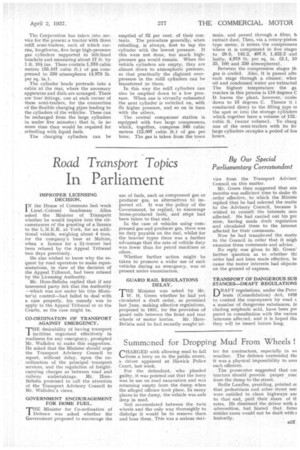Road Transport Topics
Page 51

If you've noticed an error in this article please click here to report it so we can fix it.
In Parliament
IMPROPER LICENSING DECISION.
IN the House of Commons last week Lieut.-Colonel Sandeman Allen asked the Minister of Transport whether he would inquire into the circumstances of the granting of a licence to the L.N.E,R. at York, for an additional vehicle, weighing about 4 tons, for the company's base at Malton, when a licence for a 2-tonner had been refused by the Appeal Tribunal two days previously.
He also wished to know why the request by road operators to make representations, in view of the decision of the Appeal Tribunal, had been refused by the Licensing Authority.
Mr. Hore-Belisha replied that if any interested party felt that the Authority —which was not under his (the Minister's) control—had failed to deal with a case properly, his remedy was to apply to the Appeal Tribunal or to the Courts, as the case might be.
CO•ORDINATION OF TRANSPORT AGAINST EMERGENCY.
THE desirability of having transport facilities organized effectively in readiness for any emergency, prompted Mr. Walkden to make this suggestion. He asked that the Minister should urge the Transport Advisory Council to report, Without delay, upon the coordination of the principal ' transport services, and the regulation of freightcarrying charges as between road and railway undertakings. Mr. Hore13elisha promised to call the attention of the Transport Advisory Council to Mr. Walkden's views.
GOVERNMENT ENCOURAGEMENT FOR HOME FUEL.
THE Minister for Co-ordination of Defence was asked whether the Government proposed to encourage the
use of fuels, such as compressed gas or producer gas, as alternatives to imported oil. It was the policy of the Government, be replied, to encourage home-produced fuels, and steps had been taken to that end.
In the case of vehicles using compressed gas and producer gas, there was no duty payable on the fuel, whilst for the heavier types there was a further advantage that the rate of vehicle duty was lower than for petrol machines or oilers.
Whether further action might be taken to promote a wider use of such vehicles during an emergency, was at present under examination.
GUARD RAIL REGULATIONS DELAY.
'THE Minister was asked by Mr, W. H. Green whether he had yet circulated a draft order, as promised last June, making effective regulations, proposed in 1931, for the provision of guard rails between the front and rear
wheels of motor lorries. Mr. HoreBelisha said he had recently sought ad
By Our Special Parliamentary Correspondent
vice from the Transport Advisor Council on this matter.
Mr. Green then suggested that nun months was sufficient time to Make th order effective, to which the Ministe replied that he had referred the matte to the Advisory Council, because h wished to consult the interests mos affected. He had carried out his pre mise, having made draft regulation and circulated them to the interest affected for their comments.
Now he had transferred the matte to the Council in order that it migh examine these comments and advise, No reply was given to Mr. Green' further question as to ,whether thi order had not been made effective, be cause the motor interests had objectei on the ground of expense.
TRANSPORT OF DANGEROUS SUB STANCES—DRAFT REGULATIONS nRAFT regulations, under the Petre lenna (Consolidation) .Act, 1928 to control the conveyance by road c a number of dangerous substances, in eluding sulphuric acid, have been pre pared in consultation with the variou interests affected, and it is hoped tha they will be issued before long.




























































































